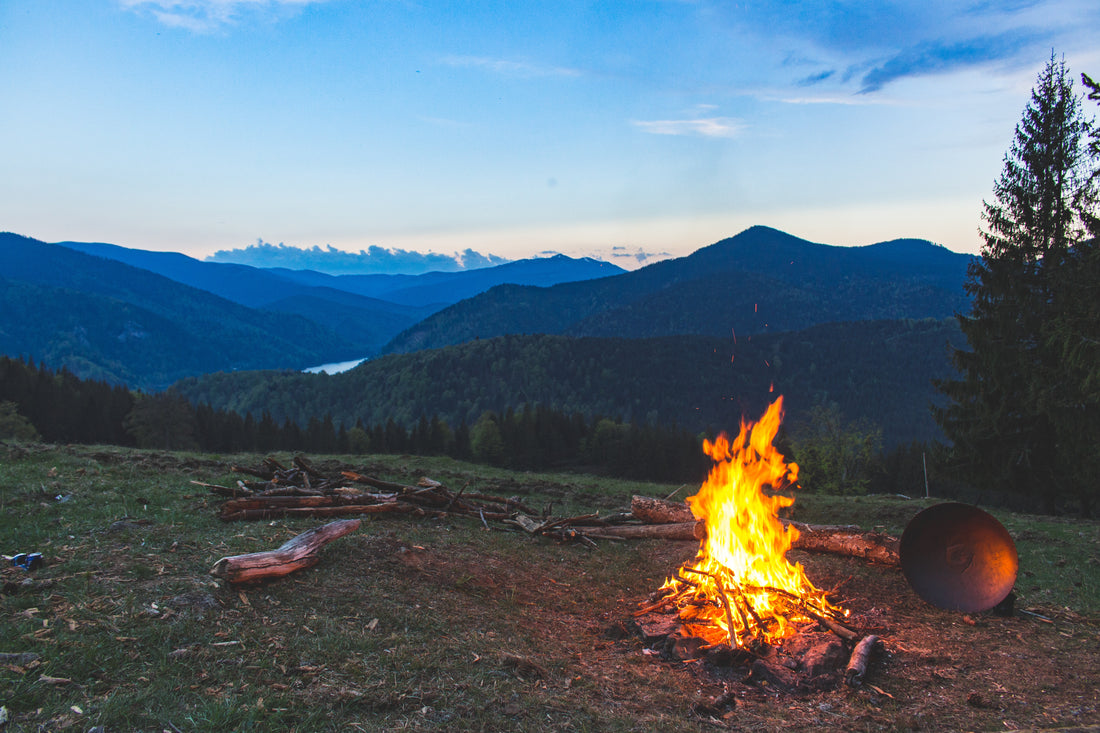Are you an outdoor enthusiast looking for your next adventure? If you've always been curious about backpacking but don't know where to start, you're in the right place! Planning your first (or next) overnight backpacking trip can seem daunting, but with the right preparation, it can be an incredibly rewarding experience.

Here are the first steps to plan an unforgettable backpacking trip.
- Choose Your Destination: The first step in planning any backpacking trip is to decide where you want to go. Research different destinations and choose one that matches your skill level and interests. Consider factors such as distance, elevation gain, weather conditions, and permit requirements. Make sure to check if there are any regulations or restrictions in place, and be aware of the Leave No Trace principles to minimize your impact on the environment.
- Gather Essential Gear: Backpacking requires specialized gear to ensure your comfort and safety on the trail. Invest in a high-quality backpack that fits you well and has enough capacity to carry all your gear. Research and purchase appropriate camping gear, including a tent, sleeping bag, sleeping pad, stove, water filter, and other essentials based on the climate and terrain of your destination. Don't forget to pack proper clothing, food, and first aid kit.
- Plan Your Route: Once you've chosen your destination, it's time to plan your route. Study maps, trail guides, and reviews to familiarize yourself with the terrain, elevation gain, and water sources along the way. Estimate the daily mileage you can comfortably hike, taking into consideration your fitness level and the difficulty of the trail. Plan your camping spots and water resupplies accordingly, and make sure to check for any trail closures or detours that may affect your route.
- Make Reservations: Many popular backpacking destinations require permits or reservations, especially for overnight stays. Research the permit or reservation process for your chosen destination, and make sure to secure them well in advance. Some permits may be limited in availability or require a lottery system, so be prepared to plan accordingly. Don't forget to bring a physical copy of your permit or reservation confirmation with you on the trip.
- Prepare Physically and Mentally: Backpacking can be physically demanding, so it's important to be prepared. Start a fitness routine that includes cardiovascular exercise, strength training, and hiking to build endurance and strength. Break in your hiking boots to avoid blisters on the trail, and make sure your gear is properly fitted and comfortable. Mental preparation is also crucial, as backpacking can be mentally challenging. Research the challenges you may face on the trail and develop coping strategies. Familiarize yourself with navigation techniques and basic wilderness first aid skills to boost your confidence and preparedness.
- Pack Smart: Packing efficiently and thoughtfully can make a big difference in your backpacking experience. Remember to pack the essentials, including food, water, shelter, clothing, and navigation tools. Opt for lightweight and compact gear to minimize the weight on your back. Pack your backpack in a way that distributes weight evenly and keeps essential items accessible. Don't forget to pack extra food, water, and clothing for emergencies, and always pack out your trash to leave no trace.
- Inform Others: Safety should always be a top priority when backpacking. Before you hit the trail, inform someone you trust about your trip plans, including your route, estimated duration, and emergency contacts. Check in with them upon your return to let them know you're safe. If possible, hike with a buddy or a group for added safety and enjoyment.
- Leave No Trace: As an outdoor enthusiast, it's your responsibility to protect the environment and leave no trace. Follow the Leave No Trace principles, which include packing out all trash, disposing of human
What to expect as a new overnight camper
 As a new overnight camper, it's important to be prepared for the challenges and experiences that come with spending time outdoors. Here are some things you should expect to encounter:
As a new overnight camper, it's important to be prepared for the challenges and experiences that come with spending time outdoors. Here are some things you should expect to encounter:
- Weather: Weather conditions can vary greatly depending on your destination and the time of year. Be prepared for changes in temperature, precipitation, and wind. Bring appropriate clothing and gear to stay warm and dry, even in unexpected weather conditions.
- Wildlife: Depending on where you're camping, you may encounter wildlife such as bears, deer, squirrels, or insects. Research the wildlife in the area and learn how to store food properly to avoid attracting animals to your campsite. Be aware of wildlife safety practices, such as not feeding animals, storing food in bear-proof containers, and knowing how to react if you encounter wildlife on the trail.
- Trail Conditions: Trails can vary in difficulty, from well-maintained paths to rugged and challenging terrain. Be prepared for uneven surfaces, steep inclines or declines, rocky or muddy trails, and stream crossings. Take caution when navigating tricky sections and be mindful of your footing to avoid injuries.
- Campsite Setup: Setting up camp requires some basic camping skills. You'll need to find a suitable spot for your tent, set up your sleeping arrangements, and establish a cooking area. Familiarize yourself with Leave No Trace principles and follow them when setting up your campsite to minimize your impact on the environment.
- Water Sources: Access to clean water is essential for camping. Research the availability of water sources along your route and plan accordingly. Be prepared to filter or purify water from natural sources such as streams or lakes to make it safe for consumption. Carry enough water or have a plan to replenish your water supply to stay hydrated throughout your trip.
- Basic Wilderness Skills: As a new overnight camper, it's important to have some basic wilderness skills. This includes navigation skills using a map and compass or GPS, starting a campfire safely, basic first aid, and understanding how to use your camping gear. Familiarize yourself with these skills before your trip and be prepared to apply them in the wilderness.
- Leave No Trace Ethics: Leave No Trace is a set of principles that promote responsible outdoor ethics. As a camper, it's important to practice Leave No Trace to minimize your impact on the environment. This includes packing out all trash, using established campsites, staying on designated trails, and respecting wildlife and other campers' privacy.
- Self-Reliance: Camping in the outdoors requires self-reliance and self-sufficiency. Be prepared to carry all your supplies, including food, water, and shelter, and be self-sufficient during your trip. This includes planning and preparing meals, managing your waste properly, and being prepared for emergencies.
- Disconnecting from Technology: Camping is an opportunity to disconnect from technology and immerse yourself in nature. Be prepared to have limited or no cell phone reception or internet access depending on your location. Embrace the opportunity to disconnect and enjoy the serenity and tranquility of the wilderness.
- Unexpected Challenges: Despite careful planning, camping trips can sometimes present unexpected challenges such as equipment failures, adverse weather conditions, or changes in trail conditions. Be mentally prepared to adapt to unexpected situations and have a contingency plan in case of emergencies.
Remember, camping in the outdoors can be an incredibly rewarding experience, but it also requires preparation, knowledge, and respect for the environment. Being aware of the challenges you may encounter and being prepared to overcome them will help ensure a safe and enjoyable overnight backpacking trip. Always prioritize safety, Leave No Trace principles, and responsible camping practices for a positive and memorable outdoor adventure.

What makes overnight camping so enjoyable?
Overnight camping can be an incredibly enjoyable and fulfilling experience for a variety of reasons. Here are some of the key reasons why many people find overnight camping so enjoyable:
- Connection with Nature: Spending a night in the great outdoors allows you to connect with nature in a unique and profound way. Breathing in the fresh air, listening to the sounds of nature, gazing at the stars, and being surrounded by the beauty of the natural world can be incredibly rejuvenating and invigorating. It provides a break from the hustle and bustle of everyday life and offers an opportunity to immerse oneself in the peacefulness and serenity of nature.
- Adventure and Exploration: Overnight camping often involves venturing into new places, whether it's a national park, a remote wilderness area, or a local campground. Exploring unfamiliar landscapes, hiking along trails, and discovering hidden gems in nature can awaken a sense of adventure and excitement. It's a chance to step out of your comfort zone, challenge yourself physically and mentally, and embark on a journey of exploration and discovery.
- Unplugging from Technology: In today's digital age, many people find it refreshing to disconnect from technology during overnight camping trips. It's a chance to break free from screens, notifications, and constant connectivity, and instead, be present in the moment and fully engage with the natural surroundings and the company of fellow campers. It allows for quality time with loved ones, self-reflection, and a sense of mindfulness and appreciation for the simpler things in life.
- Sense of Self-Sufficiency: Overnight camping often requires self-sufficiency and self-reliance. Setting up camp, preparing meals, managing resources, and navigating trails can give campers a sense of accomplishment and independence. It provides an opportunity to hone outdoor skills, build confidence, and develop a deeper connection with oneself and the natural environment.
- Peace and Quiet: Camping overnight can offer a much-needed break from the noise and chaos of modern life. Being away from the hustle and bustle of cities, traffic, and everyday stressors, and instead, enjoying the peace and quiet of nature can be incredibly calming and rejuvenating. It allows for moments of solitude, introspection, and a chance to recharge mentally and emotionally.
- Bonding with Others: Overnight camping can also be a wonderful opportunity to bond with family and friends. Sharing the experience of camping, cooking meals around a campfire, telling stories, and creating memories together can foster deeper connections and create lifelong bonds. It's a chance to disconnect from distractions and truly connect with others in a meaningful way.
- Unique and Memorable Experiences: Overnight camping often provides unique and memorable experiences that are different from everyday life. Witnessing a breathtaking sunrise or sunset, spotting wildlife in their natural habitat, stargazing in a clear night sky, or simply sitting around a campfire and sharing stories can create cherished memories that last a lifetime.
Overall, overnight camping offers a chance to disconnect from the modern world, reconnect with nature, challenge oneself, and create unforgettable experiences. It's an opportunity to slow down, appreciate the beauty of the natural world, and create lasting memories that can bring joy and fulfillment for years to come.


